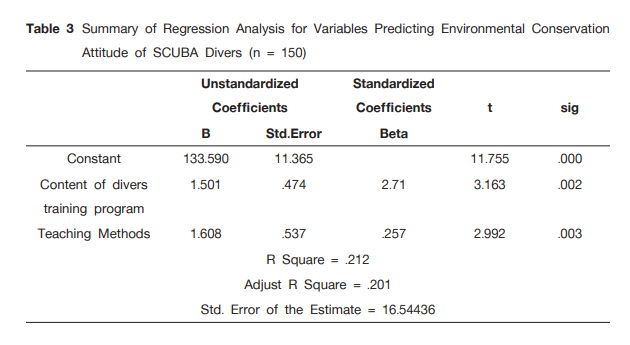ROLES OF HUMAN RESOURCE DEVELOPMENT IN ENVIRONMENT CONSERVATION ATTITUDE DEVELOPMENT: A PRELIMINARY STUDY OF THAI SCUBA DIVERS
Main Article Content
บทคัดย่อ
SCUBA diving community in Thailand has been growing rapidly in the past years. This recreational activity pushes people into a closer relationship with the environment. Additionally, environmental conservation has become an issue in focus of SCUBA diving community. To protect the underwater and marine environment, human resource development concept and process could be helpful. To be SCUBA divers, ones must go through a formal training to ensure proper knowledge, skills and attitude. As a result, Environmental conservation attitude is expected to be developed for all student divers.
Purpose This study aimed to study the relations of teaching and content relating to environmental conservation and teaching methods environmental conservation in Thai SCUBA divers’ attitude. With the trust in role of attitude in guiding ones’ behavioral intention. One with positive attitude about environmental conservation would act with care to the environment during diving and in their everyday life
Methods A quantitative study was conducted with 150 Thai SCUBA divers certified by different agencies. Data were collected using an online survey, circulating through online diving community. Data were analyzed using descriptive statistics, multiple regression analysis and one-way ANOVA.
Results The results revealed the positive relationship between content of the training and teaching approach and the Thai dives environment conservation attitude which could together explain the variability of Thai divers’ overall environmental conservation attitude by 21.2 percent (p < .01).
Conclusion The results of this study not only inform the SCUBA diving community about how to develop an attitude of SCUBA divers, but also benefits human resource development field, especially the process of learning and development in recreation and tourism context.
Article Details
เอกสารอ้างอิง
Aminrad, Z., Zakariya, S. Z. B. S., Hadi, A. S., & Sakari, M. (2013). Relationship between awareness, knowledge and attitudes towards environmental education among secondary school students in Malaysia, World Applied Sciences Journal, 22(9), 1326-1333.
Alexadar, R., & Poyyamoli, G. (2014). The effectiveness of environmental education for sustainable development based on active teaching and learning at high school level-a case study from Puducherry and Cuddalore regions, India, Journal of Sustainability Education, 7. Retrievedfrom https://www.susted.com/wordpress/content/theeffectiveness-of-environmentaleducation-for-sustainable-developmentbased-on-active-teaching-and-learningathigh-school-level-a-case-study-frompuducherry-and-cuddalore-regions-india_2014_12/
Breckler, S. J. (1984). Empirical validation of affect, behavior, and cognition as distinct components of attitude, Journal of Personality and Social Psychology, 47(6), 1191-1205.
BSAC. (2017). BSAC Diving environmental guidelines. Retrieved from file:///C:/Users/Dawisa/Downloads/1bsac divingenvironmental-guidelines.pdf
Burnett. E., Sills. E., Peterson. N. M., & DePerno. C. (2015). Impacts of the conservation education program in Serra Malagueta Natural Park, Cape Verde. Environmental Education Research, 22(4), 538-550.
Campbell, J., Waliczek, B. T. M., & Zajicek, J. M. (1999). Relationship between environmental knowledge and environmental attitude of high school students, Journal of Environmental Education, 30(3), 17-21.
Chiu, Y. T. H., Lee, W. I., & Chen, T, H. (2014). Environmentally responsible behavior in ecotourism: Antecedents and implications, Tourism Management, 40, 321-329. doi: 10.1016/j.tourman.2013.06.013 Dimopoulos, I.,
Paraskevopoulos S., & Pantis D, J. (2009). Planning educational activities and teaching strategies on conservation education module, International Journal of Environmental & Science Education, 4(4), 351-364.
Elkington, J. (1997). Cannibals with Forks: The Triple Bottom Line of 21st Century Business, Oxford, England: Capstone.
Howe, C. (2009). The role of education as a tool for environmental conservation and sustainable development (Unpublished doctoral dissertation). Imperial College, London, UK.
Hawkins, J. P., Roberts, C. M., Van’T Hof, T., De Meyer, K., Tratalos, J., & Aldam, C. (1999). Effects of recreational SCUBA diving on Caribbean coral and fish communities, Conservation Biology, 13(4), 888-897.


